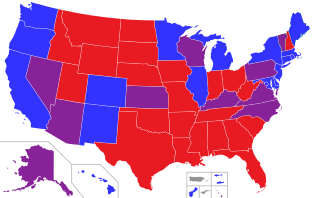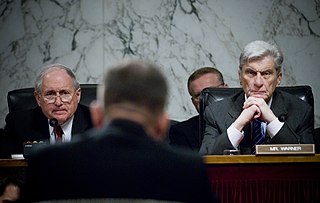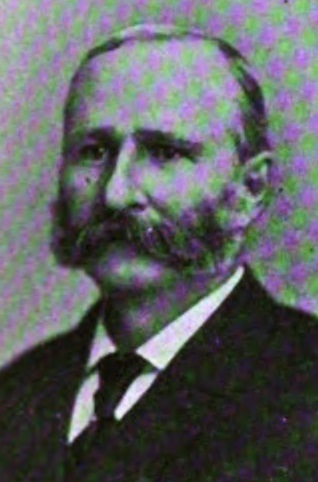External links
![]() This article incorporates public domain material from websites or documents of the National Archives and Records Administration .
This article incorporates public domain material from websites or documents of the National Archives and Records Administration .
The United States House Committee on Ventilation and Acoustics is a former standing committee of the United States House of Representatives.
The committee was established to have jurisdiction over subjects related to the ventilation and acoustics of the Hall of the House of Representatives. The ventilation and acoustics of the House Chamber had been known to be unsatisfactory from 1857 when the chamber was first occupied. Before the establishment of the standing committee, numerous select committees were named to study the problem and suggest solutions. In 1911 the committee was abolished and the subjects in its jurisdiction were included in the jurisdiction of the Committee on Accounts.
| Representative | Party | State | Years | Congress |
|---|---|---|---|---|
| George Washington Shell | Democrat | South Carolina | 1893–1895 | 53rd |
| William S. Linton | Republican | Michigan | 1895–1897 | 54th |
| Joel Prescott Heatwole | Republican | Minnesota | 1897–1899 | 55th |
| George Washington Prince | Republican | Illinois | 1899–1901 | 56th |
| Roswell P. Bishop | Republican | Michigan | 1901–1907 | 57th, 58th and 59th |
| William H. Graham | Republican | Pennsylvania | 1907–1909 | 60th |
| George D. McCreary | Republican | Pennsylvania | 1909–1911 | 61st |
![]() This article incorporates public domain material from websites or documents of the National Archives and Records Administration .
This article incorporates public domain material from websites or documents of the National Archives and Records Administration .

In the United States, the state legislature is the legislative branch in each of the 50 U.S. states.

The federal government of the United States is the national government of the United States, a federal republic located primarily in North America, composed of 50 states, five major self-governing territories, several island possessions, and the federal district/national capital of Washington, D.C., where most of the federal government is based.
In the United States Congress, standing committees are permanent legislative panels established by the United States House of Representatives and United States Senate rules. Because they have legislative jurisdiction, standing committees consider bills and issues and recommend measures for consideration by their respective chambers. They also have oversight responsibility to monitor agencies, programs, and activities within their jurisdictions, and in some cases in areas that cut across committee jurisdictions. Due to their permanent nature, these committees exist beyond the adjournment of each two-year meeting of Congress.

A congressional committee is a legislative sub-organization in the United States Congress that handles a specific duty. Committee membership enables members to develop specialized knowledge of the matters under their jurisdiction. As "little legislatures", the committees monitor ongoing governmental operations, identify issues suitable for legislative review, gather and evaluate information, and recommend courses of action to their parent body. Woodrow Wilson once wrote, "it is not far from the truth to say that Congress in session is Congress on public exhibition, whilst Congress in its committee rooms is Congress at work." It is not expected that a member of Congress be an expert on all matters and subject areas that come before Congress. Congressional committees provide valuable informational services to Congress by investigating and reporting about specialized subjects.
A congressional subcommittee in the United States Congress is a subdivision of a United States congressional committee that considers specified matters and reports back to the full committee.

Roswell Peter Bishop was an American Civil War veteran, lawyer, and a politician from the U.S. state of Michigan. He served six terms in the United States House of Representatives from 1895 to 1907.

The United States House Committee on Foreign Affairs, also known as the House Foreign Affairs Committee, is a standing committee of the U.S. House of Representatives with jurisdiction over bills and investigations concerning the foreign affairs of the United States. Since 2023, the chair of the Foreign Affairs Committee has been Michael McCaul of Texas.
Congressional oversight is oversight by the United States Congress over the executive branch, including the numerous U.S. federal agencies. Congressional oversight includes the review, monitoring, and supervision of federal agencies, programs, activities, and policy implementation. Congress exercises this power largely through its congressional committee system. Oversight also occurs in a wide variety of congressional activities and contexts. These include authorization, appropriations, investigative, and legislative hearings by standing committees; which is specialized investigations by select committees; and reviews and studies by congressional support agencies and staff.

The Alabama State House of Representatives is the lower house of the Alabama Legislature, the state legislature of state of Alabama. The House is composed of 105 members representing an equal number of districts, with each constituency containing at least 42,380 citizens. There are no term limits in the House. The House is also one of the five lower houses of state legislatures in the United States that is elected every four years. Other lower houses, including the United States House of Representatives, are elected for a two-year term.

The Speaker of the Texas House of Representatives is the presiding officer of the Texas House of Representatives. The Speaker's main duties are to conduct meetings of the House, appoint committees, and enforce the Rules of the House. The current speaker is Dade Phelan, a Republican from Beaumont, who was elected Speaker on January 12, 2021.
The United States House Committee on Accounts was a standing committee of the US House of Representatives from 1803 to 1946. It had purview over the financial accounts of the House's contingent fund, as well as some matters related to facilities and staffing. In 1946, it was merged into the newly formed the Committee on House Administration.
The United States House Committee on Mileage is a former standing committee of the United States House of Representatives.
The United States House Committee on Elections is a former standing committee of the United States House of Representatives.
A committee of the whole is a meeting of a legislative or deliberative assembly using procedural rules that are based on those of a committee, except that in this case the committee includes all members of the assembly. As with other (standing) committees, the activities of a committee of the whole are limited to considering and making recommendations on matters that the assembly has referred to it; it cannot take up other matters or vote directly on the assembly's business. The purpose of a committee of the whole is to relax the usual limits on debate, allowing a more open exchange of views without the urgency of a final vote. Debates in a committee of the whole may be recorded but are often excluded from the assembly's minutes. After debating, the committee submits its conclusions to the assembly and business continues according to the normal rules.

George Washington Prince was a U.S. Representative from Illinois.

The United States House of Representatives is the lower chamber of the United States Congress, with the Senate being the upper chamber. Together, they comprise the national bicameral legislature of the United States. The House is charged with the passage of federal legislation, known as bills; those that are also passed by the Senate are sent to the president for signature or veto. The House's exclusive powers include initiating all revenue bills, impeaching federal officers, and electing the president if no candidate receives a majority of votes in the Electoral College.
The Joint Committee on Enrolled Bills was a joint committee of the United States Congress operating from 1789 to 1876. It was one of the first standing committees established by Congress, having been created July 27, 1789 during the 1st Congress.

The United States Senate is the upper chamber of the United States Congress. The United States Senate and the lower chamber of Congress, the United States House of Representatives, comprise the federal bicameral legislature of the United States. Together, the Senate and the House have the authority under Article One of the U.S. Constitution to pass or defeat federal legislation. The Senate has exclusive power to confirm U.S. presidential appointments to high offices, approve or reject treaties, and try cases of impeachment brought by the House. The Senate and the House provide a check and balance on the powers of the executive and judicial branches of government.
The Committee on Coinage, Weights, and Measures was a standing committee of the United States House of Representatives from 1864 to 1946.